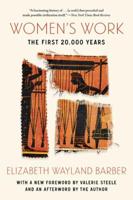Publisher's Synopsis
Mexican Americans today are well established in the US, but it was an arduous century-long struggle--and the key participants in this effort have been the women. Whether living in a labor camp, a boxcar settlement, a mining town, or an urban barrio, Mexican women nurtured families, worked for wages, built extended networks (including fictional "uncles" and "aunts"), and participated in community associations --- efforts which solidified the community and helped Mexican Americansfind their own place in America. Now, in From Out of the Shadows, historian Vicki L. Ruiz provides the first full study of Mexican-American women in the 20th century, in a narrative that is greatly enhanced by Ruiz's skillful use of interviews and personal stories, capturing a vivid sense of theMexicana experience in the United States.Ruiz begins with the first wave of Mexican women crossing the border from Mexico early in our century. She reveals that between 1910 and 1930, over one million Mexican men and women (perhaps as much as ten percent of Mexico's population) migrated "al otro lado," joining the hundreds of thousands of Mexican-Americans already living in the Southwest United States. We learn how the women would rise before dawn to prepare the masa for fresh tortillas, then work all day in thefields, then return to household chores in the evening, cooking, or laboring over a washboard and tub, late into the night. Ruiz illuminates attempts to Americanize the Mexicanas, especially by Protestant groups, whose efforts by and large failed; the women instead relied on their own community groups ---mutualistas (mutual aid societies), parish organizations, auxiliaries, and labor unions --- to help them assimilate. We also read about the tensions that arose between generations, as the parents tried to rein in young daughters eager to adopt American ways --- forbidding the use of makeup and insisting that teenage girls attend a dance, a movie, or even a church function with a chaperone, usually their mothers. Perhaps most important, the book highlights the various forms of politicalprotest initiated by Mexican-American women, including civil rights activity and protests against the war in Vietnam. Here is a dramatic story of how and where political protest developed, and of the groups Mexicanas formed to channel their voice. And in particular, it is the story of how these protestgroups developed bonds of social cohesion that strengthened their community and helped them find their own public space and a role for themselves in America.What emerges from the book finally is a portrait of a very distinctive culture in America, one that has slowly gathered strength in the last 95 years. From Out of the Shadows is an important addition to the largely undocumented history of Mexican-American women in our century.











